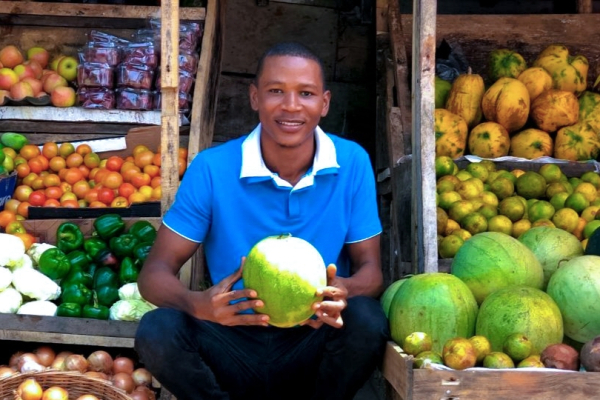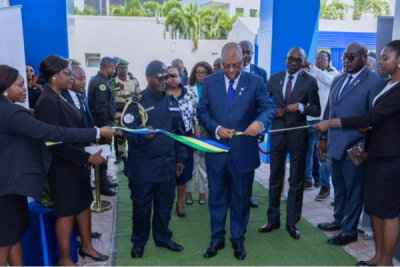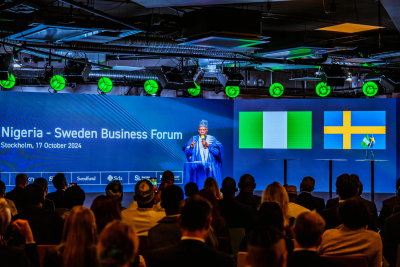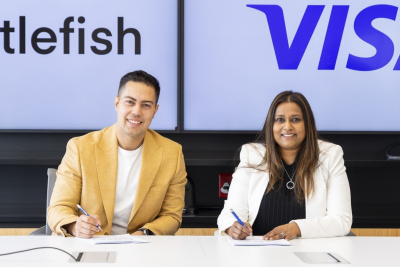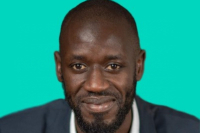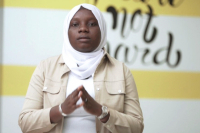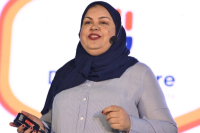A screenwriter, director, and writer, he became an entrepreneur to support rural farmers. By leveraging technology, he helps them sell their products to a wider audience.
Abdulai Barrie, a Sierra Leonean entrepreneur, is the founder and CEO of Salone Agro Market, a technology platform focused on agriculture. The platform’s primary goal is to empower farmers while improving their market access across Sierra Leone.
Founded in 2019 and registered under the startup SALGRO Ltd., Salone Agro Market connects buyers and sellers of agricultural products. It provides small and large farmers alike with a marketplace to sell their produce, while also facilitating access for commercial businesses and large enterprises seeking to purchase these products.
In addition to connecting buyers and sellers, Salone Agro Market supports small farmers by providing access to inputs, processing equipment, transportation solutions, and information systems. The platform is accessible offline via USSD codes, ensuring maximum inclusivity. It also offers real-time information on market prices, weather forecasts, and facilitates direct transactions between sellers and buyers.
Alongside his work at Salone Agro Market, Abdulai Barrie is the editor of the Commonwealth Youth Council newsletter, an organization focused on youth development within the Commonwealth. He also serves as a project manager at Sierrapreneurs, an initiative promoting youth entrepreneurship in Sierra Leone. Since 2018, he has been the co-founder and creative director of Creative Media Network SL, a multimedia production company.
Abdulai Barrie holds a certificate in entrepreneurship, financial management, and reporting for innovators, awarded in 2021 by the Institute of Public Administration and Management at the University of Sierra Leone. A former screenwriter and director, he also worked as a writer for Hidden Voices Africa, a platform publishing human interest stories, from 2023 to 2024.
In recognition of his commitment to innovation and social development, Abdulai Barrie secured third place in the 2024 Orange Social Venture Prize in Africa and the Middle East (POESAM) in Sierra Leone. He will represent his country in the continental phase of the competition.
Melchior Koba
The entertainment industry is thriving across the continent. Tech entrepreneurs are creating innovative digital solutions to streamline various aspects of event management, among other things.
Akwaaba is a digital solution developed by a Ghanaian startup that offers users venue recommendations, the ability to purchase event tickets online, and the chance to earn rewards by sharing the app and referring others.
Founded in 2012, it features an iOS and Android app, with the Android app boasting over a thousand downloads on the Play Store. Through those mobile apps, users can create their accounts to, among other things, make reservations at places like restaurants, cinemas, and fast-food outlets in the cities of Accra and Kumasi.
Event organizers and venue promoters can also leverage Akwaaba to sell tickets, manage bookings, and benefit from marketing support. To boost engagement, the startup has launched a rewards program aimed at "generating more user involvement and revenue for local businesses, helping them thrive in an increasingly competitive market."
Additionally, the startup has partnered with social media content creators to enhance its visibility. “By leveraging the power of social media, the Influencer Programme will engage a wider audience and increase app downloads, further solidifying Akwaaba’s position as the viable event platform in Ghana," explained Kingsley Kordie, Akwaaba’s director.
Adoni Conrad Quenum
African youth stand at the brink of a transformative era, requiring a collective effort to harness their potential for leadership and innovation. By investing in their education and training, they can become a driving force for the continent's development.
On Monday, October 21, Gabon's Deputy Prime Minister, Alexandre Barro Chambrier (photo, center), inaugurated the Gabonese Innovation Center (CGI). This initiative aims to transform the country's tech and entrepreneurial ecosystem, positioning Gabon as a key player in Central Africa’s technology sector.
"The Gabonese Innovation Center is not just a tool for technical development; it’s a catalyst for digital and social transformation. It will undoubtedly help develop our strategic economy with a single goal in mind: to be ready to address future threats. It is a guarantee of success," stated General Bonjean Frédérik Mbanza, the Minister of Digital Economy.
The CGI hosts several innovation-focused spaces, including a certification center for acquiring recognized digital skills, a FabLab (a creation and innovation space equipped with advanced technologies), a media lab for digital media collaboration, and a digital acclimatization hub (crucial for preparing Gabon for innovation and digital transformation).
This new center is part of Gabon's ongoing digital transformation, which seeks to make digital technology a driver of economic and social growth. As a result of these initiatives, the country ranks 10th on the continent with an ICT development index of 74.7 out of 100, according to the latest 2024 report from the International Telecommunication Union (ITU). In 2023, Gabon also held this position with a score of 72.9, reinforcing its progress in this strategic field.
The CGI will provide young people with opportunities to acquire certified skills in digital technologies, enhancing their employability in an increasingly digitized economy. By facilitating access to these new skills, the center is also expected to contribute to youth empowerment and their active participation in the country’s economic development.
Samira Njoya
Like many countries, Tunisia has embraced digital technology to modernize its operations. This initiative aims to enhance the efficiency and accuracy of processes, particularly when it comes to data collection.
Tunisia is set to conduct its thirteenth General Population and Housing Census from November 6 to December 31. This census, fully digitized, marks a shift from traditional paper-based methods. The government formalized the announcement with a decree issued by the head of government on Wednesday, October 16.
To ensure the success of this digital-first initiative, the National Institute of Statistics (INS) developed a Tunisian-made application to centralize data collection and enable real-time processing. Additionally, 9,000 tablets have been procured for census agents, who will visit households across the country. The project has a total budget of 89 million dinars (approximately 28.8 million USD), with 24% dedicated to IT infrastructure.
This initiative aligns with the country’s 2026-2030 development strategy. It is also part of the digital transformation efforts outlined in the National Strategic Plan “Tunisia Digital 2020.” The government is leveraging digital technology to optimize various sectors, including the census, where data accuracy is critical.
The use of digital tools will not only speed up the census process but also improve its accuracy. Tablets and a dedicated app will help eliminate errors often associated with manual methods. Real-time data collection will provide reliable statistics, essential for public policy planning, and enhance overall efficiency. Preliminary results are expected to be published in February 2025, with detailed data available by September 20, 2025.
Samira Njoya
As Africa’s digital economy continues to grow, investments in the sector become crucial. These investments play a critical role in driving sustainable development across the continent.
Nigeria has announced a $119 million investment aimed at strengthening its tech hubs and supporting the growth of micro, small, and medium-sized enterprises (MSMEs). The announcement was made following a meeting between Nigeria's Vice President Kashim Shettima and Swedish investors in Stockholm on October 17.
Vice President Shettima highlighted the importance of the investments, noting that "The government's 'Renewed Hope Agenda' emphasizes creating a competitive business environment that attracts both foreign and domestic investments.”
A key portion of the investment—$100 million—comes from Gluwa, a decentralized financial platform, which has committed to enhancing digital skills in the country. Gluwa’s Director, Akinola Jones, outlined plans to train over 30,000 Nigerians in digital technologies.
Additionally, Ericsson's Managing Director for Nigeria, Peter Olusoji Ogundele, revealed plans to invest $19 million in building a technology hub. Ogundele emphasized that the initiative would help develop local talent, positioning Nigeria as a global player in tech services.
Nigeria continues to attract substantial investor attention. At the recent GITEX Global event in Morocco, the UAE demonstrated interest in the country’s burgeoning tech sector, aiming to support the growth of its dynamic startup ecosystem. This highlights the increasing recognition of Nigeria as a key player in Africa’s tech innovation landscape.
According to Nigeria’s National Bureau of Statistics (NBS), the information and communication sector contributed 13.12% to the total Nominal GDP in the 2024 first quarter, highlighting the importance of digital transformation.
Hikmatu Bilali
SMEs employ the majority of people on the continent. However, they face numerous challenges, including limited access to capital, markets, and digital resources, which hampers their growth and ability to scale. Addressing these challenges is essential for achieving sustainable socioeconomic development in Africa.
On October 16, Littlefish announced a partnership with Visa to enhance digital experiences for businesses, providing advanced solutions for both in-store and online transactions. The omnichannel platform offering business solutions to financial institutions aims to empower micro, small, and medium-sized enterprises (MSMEs) across Africa.
Co-founder and CEO of Little Fish Brandon Roberts noted the importance of delivering “a seamless, cost-effective digital platform that empowers financial institutions to support sustainable growth in the MSME sector.”
The partnership also integrates Visa's CyberSource system, enhancing secure payment processing and opening the door for future products like remittance flows, lending, and loyalty programs. This collaboration marks a crucial step towards digital transformation for MSMEs in Africa, making commerce more efficient and accessible across the continent.
According to Forbes Africa, citing the World Economic Forum, MSMEs account for around 80% of businesses and more than 50% of the GDP in Africa. This underscores their importance to economic stability and job creation. However, these businesses often struggle with limited access to digital payment solutions and financial tools, which can hinder their growth potential.
As cash transactions continue to dominate daily business in Africa despite global digital payment trends, this collaboration addresses a significant gap. Visa and Littlefish will offer innovative payment solutions through traditional POS systems, mobile POS, Tap2Phone, and e-commerce channels, coupled with value-added services designed to streamline MSME operations and support growth.
Hikmatu Bilali
As a tech entrepreneur, he develops digital solutions to help businesses enhance their performance. He has already co-founded several companies.
Mamadou Ndiaye (photo) is a Senegalese IT specialist and entrepreneur. He is the co-founder and CEO of Appsaya, a startup offering digital solutions designed to optimize community and event management across Africa.
Founded in Malaysia in 2015, Appsaya provides event organizers with a platform featuring real-time data management and analytics tools. The platform also supports the creation of dynamic communities and enhances networking opportunities through artificial intelligence, helping small and medium-sized enterprises access new markets.
“Our solution efficiently manages professional communities, encourages connections, boosts engagement, and fosters collaboration. Additionally, our platform offers various monetization opportunities,” the company states.
On October 10, Appsaya earned third place at the Orange Social Venture Prize Africa and Middle East (POESAM), receiving a reward of 3 million CFA francs (approximately 5,000 USD).
Beyond his role at Appsaya, Mamadou Ndiaye serves as a strategic advisor at MY Evolution, an IoT connectivity provider. In 2013, he co-founded iReservos, an appointment management platform for service businesses in France, serving as its CEO until 2016.
In 2020, he co-founded La French Tech Malaysia, a French-Malaysian tech community based in Kuala Lumpur, Malaysia. The following year, he launched Wasabih, a Malaysian startup that connects professionals and businesses within various sectors of the halal economy.
Mamadou Ndiaye holds a master’s degree in electrical and computer engineering from ESIGELEC, an engineering school in France. His professional journey began in 2005 at DXC Technology as a computer engineer. In 2010, he worked as an international project manager for L’Oréal, the French beauty company.
In 2012, he became a project director at Shine Mobile Gibraltar, a UK-based telecommunications company. In 2014, he joined update software AG, a French IT firm, as a consultant. From 2020 to 2022, he worked as a senior project manager at JCDecaux, a French advertising company.
Melchior Koba
She promotes healthy and environmentally friendly farming practices, using technology to help farmers make informed decisions.
Afoussata Thiam (photo) is a Senegalese information and communication technology (ICT) and sustainable agriculture expert. She is the founder and CEO of AGROMET SERVICE, a tech startup dedicated to optimizing agricultural practices.
Founded in 2021, AGROMET SERVICE aims to address the social and environmental challenges faced by farmers, particularly those related to climate change. The company specializes in designing smart, connected weather stations that provide farmers with real-time meteorological data and alerts about climatic conditions.
“Unlike other methods that are not accessible to everyone, this eco-friendly solution is equipped with reliable and durable weather sensors, paired with a simple and user-friendly application. Our product is accessible, affordable, and profitable,” the startup explains.
On October 10, Afoussata Thiam secured second place for AGROMET SERVICE at the Orange Social Venture Prize Africa and Middle East (POESAM) in Senegal, earning a reward of 4 million CFA francs (approximately 6,600 USD).
Afoussata Thiam graduated from the University of Sine Saloum El-Hadj Ibrahima Niass in 2022 with a degree in AgroTIC, or ICT applied to agriculture.
Melchior Koba
The Nigerian government is taking steps to develop digital skills among its population, with a focus on its youth. In May 2024, Nokia partnered with the country's telecom regulator to train young Nigerians in 4G and 5G technologies.
Swedish tech company Ericsson plans to invest $19 million in building a technology center in Nigeria. The initiative was disclosed on Thursday, October 17, by Peter Olusoji Ogundele, the managing director of the company’s Nigerian subsidiary, during a business forum held as part of a two-day working visit by Nigeria's Vice President, Kashim Shettima (pictured), in Sweden.
“Nigeria has enough youths that can come into that field. We can train them, Ericsson will also take part in it, and some of them we can export to the world, and we will be like another India,” Ogundele stated.
This partnership comes in the context of increasing demand for digital skills as the country’s digital transformation accelerates. In October 2023, the government launched the "3 Million Technical Talent (3MTT)" program, aiming to train 3 million Nigerians in technical skills over three years. In recent months, it has also formed partnerships with companies such as Finnish equipment manufacturer Nokia and telecom infrastructure builder IHS Towers to train Nigerians in digital competencies.
Ericsson’s initiative is expected to create additional jobs and enhance the skills of workers, addressing the growing need for a qualified workforce as Nigeria’s digital transformation progresses. A 2021 World Bank study estimates that Nigeria will require approximately 28 million workers trained in digital skills across various economic sectors by 2030.
Isaac K. Kassouwi
Fully aware of the importance of building an inclusive digital economy for the deaf community in Tunisia, she leverages technology to connect deaf individuals to employment opportunities.
Sonia Kherigi Nasfi (photo) is a Tunisian computer scientist and tech entrepreneur. She is the founder and CEO of Deaf Square, an online platform that serves as a career accelerator for deaf individuals by connecting deaf talents with employers.
Deaf Square is dedicated to empowering the deaf community. It offers tools for learning sign language, a personalized job-matching service, and training for employers to promote inclusive work environments. Using artificial intelligence, the startup works to enhance the social and economic inclusion of the hearing impaired. It provides an AI-empowered virtual trainer that offers adaptive learning in multiple languages, ensuring personalized support for each user.
“At Deaf Square, we offer courses exclusively in sign language. Our team consists of deaf, hard-of-hearing, and hearing individuals. All our developments are based on user experience. Often, companies are legally required to hire people with disabilities but don’t know where to find these talents. Our job is to connect deaf talents with employers,” explains Sonia Kherigi Nasfi.
Since 1998, Sonia has also held the position of director at the Central Bank of Tunisia. In 2019, she became a coach in NLP (neuro-linguistic programming). She is also the focal point for the association Positiver in Tunis, supporting regional initiatives, particularly by mentoring youth and women in project development.
A graduate of the Higher Institute of Management in Tunis, where she earned a master’s degree in IT management, Sonia made headlines in July 2024 when she won the regional prize at the 11th edition of the Northern Africa Startup Awards, part of the Global Startup Awards Africa. She is also the 2024 winner of the Tunisian stage of the Orange Social Entrepreneur Prize in Africa and the Middle East (POESAM).
Melchior Koba
More...
Nigerian startups focused on sustainability and innovation are invited to apply for the Sterling Bank Green Innovation Challenge.
The initiative offers NGN2 million (US$1,200) grants for cleantech and social enterprise ventures and a NGN20 million (US$12.2 million) facility for agriculture businesses.
Applications are open until October 20. Applicants must have operated for at least two years, offer locally developed solutions, and have a scale-up plan.
Cybersecurity is becoming increasingly important as more of Africa’s economy, businesses, and public services go digital. Establishing cybersecurity infrastructure is a crucial step for several reasons, particularly given the context where data protection and digital security are critical for economic stability and growth.
The Federal Government of Nigeria, in partnership with cybersecurity firm Cisco, has announced plans to establish a state-of-the-art cybersecurity and broadband laboratory. This initiative aims to strengthen Nigeria's digital infrastructure and enhance its cybersecurity capabilities.
The announcement was made by Minister of Communications and Digital Economy, Bosun Tijani, after an inspection of the proposed facility on October 16. He noted that the collaboration with Cisco follows months of discussions, including talks "most recently on the sidelines of the United Nations General Assembly (UNGA79) in New York, where they reaffirmed their commitment to supporting our digital transformation initiatives."
Cybercrime in Nigeria is on the rise, with data breaches increasing by 64% in Q1 2023 compared to the previous quarter, the National Bureau of Statistics (NBS) highlights this concerning trend. This makes the initiative even more crucial for economic stability.
The lab will play a significant role in improving the country's cybersecurity capabilities, which is essential as more Nigerian businesses and individuals adopt digital platforms. Strengthening cybersecurity will not only help to protect sensitive data but also boost public confidence in Nigeria’s digital economy, enabling its continued growth.
Hikmatu Bilali
He is an entrepreneur passionate about sustainability and innovation in Morocco. Through his startup, Savey, he has established himself as a key player in promoting sustainable and responsible food practices.
Ouahi Zakaria (photo) is a Moroccan entrepreneur, co-founder, and CEO of Savey, a digital and logistics solution combating food waste.
Savey is a Moroccan initiative aimed at reducing industrial food waste by offering a distribution channel for unsold, overstocked, or nearly expired products. It connects manufacturers, producers, and distributors with restaurants, cafes, hotels, pastry shops, and bakeries, among others, while also providing free delivery services.
“Our mission is to move towards zero food waste by creating a multidimensional impact on the ecosystem and positively influencing our consumption habits to optimize the use of still-edible food,” states the company’s website.
Committed to protecting the planet, the startup also engages in charitable actions. Every day, it distributes hundreds of meals, collected from its partners, to homeless individuals. It also supplies zoos and associations with food donations.
In September 2024, Ouahi Zakaria won first place in the national stage of the Orange Social Entrepreneur Prize in Africa and the Middle East (POESAM).
Melchior Koba
The Djiboutian government has outlined a clear vision: to drive the country toward digital emergence by 2035. A cornerstone of this transformation is the expansion of high-speed internet infrastructure, which the government sees as a vital catalyst for achieving this ambitious goal.
On Wednesday, October 16, Djibouti took a significant step toward digital transformation with the launch of its national broadband development strategy. The official presentation was held during a workshop organized by the Ministry of Communication, in charge of Posts and Telecommunications. This ambitious plan aims to accelerate the expansion of fiber-optic coverage and democratize access to high-speed internet, both fixed and mobile, across the entire country.
According to the Minister of Communication, responsible for Posts and Telecommunications, Radwan Abdillahi Bahdon (photo), the new strategy advocates for lower tariffs and doubling internet speeds without increasing costs. It also focuses on regulatory frameworks, promoting computer literacy, and developing infrastructure, among other priorities.
The initiative is part of the “Djibouti Digital Foundation” project. Supported by the World Bank, this project aims to transform Djibouti into a tech hub by 2035 by promoting digital services and creating a favorable environment for private sector investments in ICT.
Early results of this strategy include the deployment of 250 km of fiber-optic cable in the northern part of the country and the connection of over 100 administrative buildings to high-speed networks. These efforts have helped bridge the digital divide between regions and modernize public services.
With this new strategy, Djibouti aims to address its internet challenges. The country is currently connected to nine submarine fiber-optic cables. Despite these multiple connections, the World Bank has raised concerns about the high cost and poor quality of internet service. In its 2023 diagnostic report on Djibouti's digital economy, the international institution highlighted that the price of high-speed internet in Djibouti is among the highest in the Middle East and North Africa (MENA) region.


